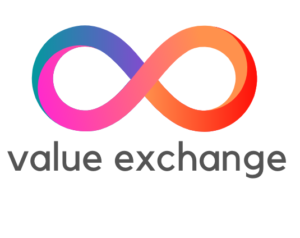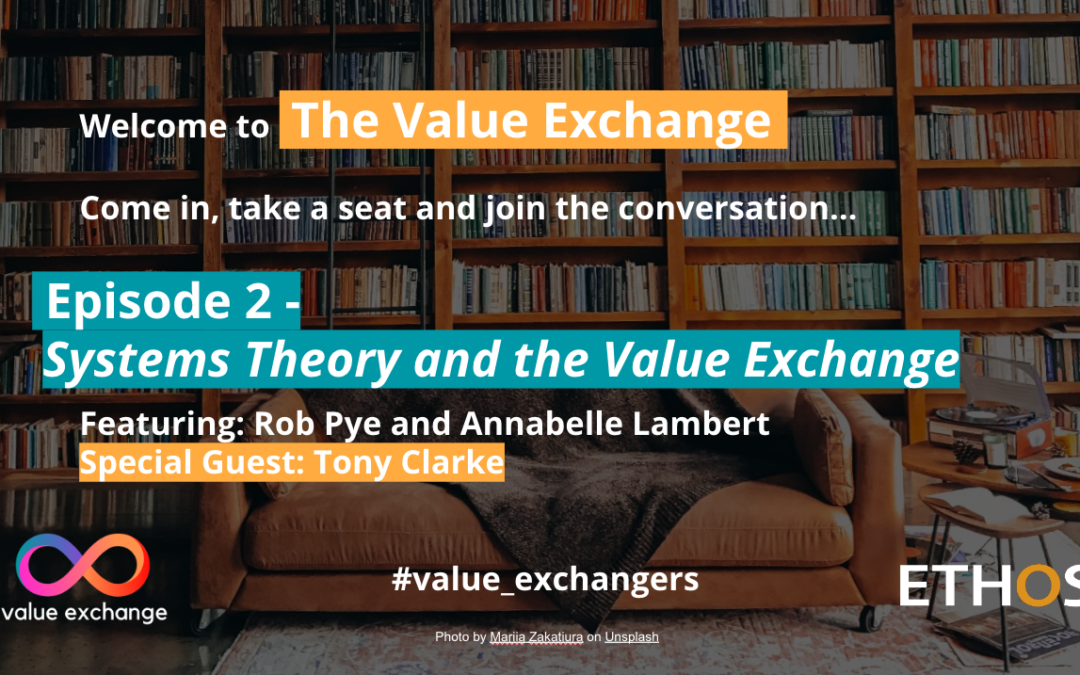Photo by Mariia Zakatiura on Unsplash
Welcome to The Value Exchange, as part of our 2023 (and beyond) endeavour to be working out loud a lot more we will be sharing our regular videocast/podcast/transcript which capture some great conversations which we hope will uncover a few hidden (and maybe not so hidden) gems from at least 24 years of doing, failing, learning and thinking.
Episode 2 – Part 1 – Systems Theory and the Value Exchange sees us joined by our special guest and long time work colleague Tony Clarke. Tony has been practising Systems Thinking for at least the last 30 years. Using it to explore possibilities and movement towards effective change. In this short conversation he highlights where Systems Thinking meets the practice of Value Exchange and how individuals through capturing a story that keeps unfolding can test their own and others perspectives, opening themselves up to other mental models, and how powerful that can be in making sense of the world and what outcomes they are looking to achieve in it.
WATCH/READ NOW
Youtube video – Episode 2 – Part 1 – Systems Theory and the Value Exchange (click to watch)
Transcript – scroll to see text below
If you want to join the conversation and participate in The Value Exchange, then Get in touch
TRANSCRIPT – Episode 2 – Part 1 – Systems Theory and the Value Exchange
[00:00:15.050] – Annabelle Lambert
Hurrah, we’re live. Welcome to the next edition of the Value Exchange today, joined with my long term colleagues, Rob Pye and a special guest, Tony Clarke, all the way from a mountain in North Wales. We’ll start with the introductions. So, Rob, tell us tiny, tiny little bit about yourself, in case anyone’s forgot since last time.
[00:00:38.970] – Rob Pye
Yeah, I’m Rob, living in Surrey with three six foot something boys and I’ve been really studying through Practise, the future work since EY days with Annabelle and Tony in the 90s, since 99, 2000.
[00:00:57.170] – Annabelle Lambert
Thank you for that. Tony, what about you?
[00:01:00.040] – Tony Clarke
Yeah, Tony Clarke, as Rob said, also been on this journey exploring all aspects of work, how organisations work, why they work, all that kind of good stuff. And as pointed out, I live up in North Wales.
[00:01:19.610] – Rob Pye
Annabelle, you better say who you are…
[00:01:21.630] – Annabelle Lambert
Yeah, of course. So I’m Annabelle Lambert. I’m based in West Sussex, originally from Staffordshire. 2 miles from Alton Towers is where I grew up. I’m a mum. I’ve got two kids, 14 now, birthdays last week and 17 year old. And my thing, my journey here, has been all about people. Why they do stuff, why they don’t do stuff, and how that is sort of outing itself, actually, through Value Exchange, this very precious thing that I’ve been working on, learning from, continue to learn from, for the last 24 years. 24 years in the making, I think we’re saying here. So where do we want to start today? What do we want to talk about? Tony mentioned something about systems thinking was on your mind. How does that fit?
[00:02:04.740] – Tony Clarke
Yeah, it’s a topic that is kind of dear to my heart. I think you both would know that it’s something I do. But increasingly, over recent years, perhaps not that long, maybe I’ve started to reflect a bit about what do I mean when I talk about systems thinking? And now I’m not alone in this. There’s a movement out there that’s beginning to grow, that’s saying, we’re too used to using that label now without actually unpicking what we mean by it. Thinking. It’s all about thinking, systems thinking. We’re some sort of adjective describing how we do our thinking. And I’m intrigued by looking for some kind of overarching frame that probably doesn’t exist, which is fine, but looking for it is what’s important. Looking for some sort of overarching frame that begins to tie a lot of the kind of modelling techniques that I’ve used over the years, the ways of engaging people, how people interact. It covers everything right through from hard systems thinking, process modelling, all the way through to culture, ethnography type thinking, the whole works. Are there frames that will help solve the big problems, the wicked problems they are sometimes called, aren’t they?
[00:03:30.280] – Tony Clarke
The really big problems that we can draw and not get too hung up on particular techniques, particular frames, whatever it is, but nevertheless find some way of investigating those difficult problems, those really big problems. And at some level, it’s all about we draw up models of mental models. This is what I do. I frame pictures, themes about the way I think the world works. Now, I know it’s not right. I’m not trying to make it right. I’m not even trying to describe the real world because I know I can’t. The real world is way, way too complex, too many variables, too difficult to model. So what I’m doing and why I’m doing it is to give me a baseline to reflect on the real world, to explore it, to ask questions about it, to get feedback from others, to engage in a conversation about, okay, it may be my mental model, but do other people share it? Do other people see aspects of the system we’re talking about in the same way that I do? It’s only by reifying it, making it real, making it explicit in some way. I don’t care what the model is, what the grammar of the model is, how sophisticated or simple. What matters is that we can have a conversation about that particular system, that particular context, and find commonality and explore what could be different and how it might be different. And that’s the beginning of change, that’s the beginning of adapting. And I use those two words interchangeably. They’re quite subtly definable in the context of systems. But yeah, that’s something at the root. So for me, it’s a bit of a quest to unpick what I’ve been doing for years, I believe, which I would call systems thinking, but how to make it a bit more real and understand how to apply it in a more consistent way in different contexts.
[00:05:33.290] – Rob Pye
In the context there might be a tiny bit of lag, but in the context of your work in Ethos and this thing that we’ve got called value exchange, which is this rich conversation with an individual about work in the broadest sense not just paid work, employment, but their beliefs and values, et cetera. What might this bring to systems theory, if anything, that you’re thinking about? How has this informed your view of system thinking? And what’s its role in your big mind map with lots of nodes in it?
[00:06:12.580] – Tony Clarke
Yeah, there’s a lot of connectivity. What we’re doing around the value exchange process is we’re each creating mental models for it, what it does, how it works. It’s all about systems. It’s all about the boundaries and how do we make those less rigid. So the value exchange encourages the individual to engage with a community of people, ideally not just within the confines of the institution that they’re currently engaged in or the context they’re engaged in, but having a slightly wider context. And I think from a system’s point of view, that can only be healthy because it helps someone understand where they fit, how they might fit, and just to be open to other mental models, other views of how things might operate. So it all becomes a bit convoluted because I do think the value exchange has taken me I mean, I’ve reflected on it a lot since we’ve been doing it over the last few years and I’ve come to believe it’s a very powerful mechanism that allows people to effectively explore how they see things and to engage others in a conversation that helps them get a bit of reflection on that. Not just the way I see the world, but hang on a minute, I’ve got a story to tell. But when I tell that story, how do others respond to it? How do others see what I’m seeing and how do they play back to me? And of course, as we say, it’s not an event, it’s an ongoing activity. There is an opening, perhaps, sort of choreography, in which there is an exchange, the story and others you engage, all the rest of it. But it’s ongoing and the whole idea is it keeps on unfolding. And I do think it’s a huge opportunity for people to have the opportunity to have their models, their mental models, their perspectives on things tested and reflected on. So fundamental it’s in that whole gamut of frameworks and techniques that help people begin to understand better, that we can’t describe the real world absolutely. But what we can do is create versions of it. Mental models, models, everyone called, that allow us to talk about it and share our perspectives. And there ain’t nothing better than a bit of communication with people aligning and trying to understand what they see common and what they see different. And there are lots of, we don’t go too far here, perhaps into the sort of some of the theory behind that, but there’s a lot that one could talk about in terms of systems and how they operate.
[00:08:54.490] – Tony Clarke
Anyway.
[00:08:55.690] – Rob Pye
Okay, annabelle, I think, has a barking dog.
[00:08:58.130] – Annabelle Lambert
I do I do, I don’t really want a barking dog.
[00:09:04.830] – Rob Pye
So I think we’re going to wrap up this episode and maybe chunk it up into two or three episodes. But until the next one, I think I am going to end the recording now and I’m not sure any final words, Tony, that you want to reflect on?
[00:09:24.690] – Tony Clarke
No, I mean, I’m happy to do this again. Obviously there’s quite a lot we could talk about, I suspect. No worries.
[00:09:33.080] – Rob Pye
And Annabelle, who was hosting this until the dog started. Final words? Thoughts?
[00:09:37.640] – Annabelle Lambert
Lots to think about. I want to scrap from the whole lexicon, client and customer, but lots to explore just because they infer behaviour which I really don’t want people to be pursuing anymore. I’m just not into that. I’ve been for years on the basis of like, I don’t want to have clients. I will have people that I work with because we’re trying to solve a problem together. I’m not a slave to a master. But anyway, that’s probably for a very much another conversation. Lots to explore there. Thank you both.
[00:10:14.680] – Rob Pye
Good bye from us for this one.
[00:10:17.320] – Tony Clarke
Thank you.

